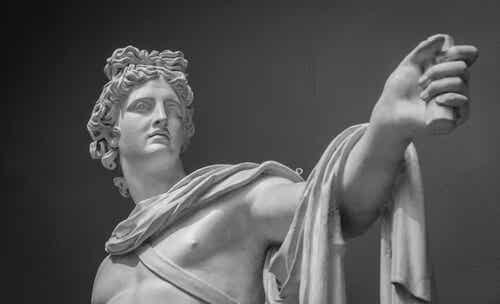The Myth of Daphne and the Fear of Sex

One can’t leave out Apollo when talking about the myth of Daphne, as their stories go hand in hand. Psychology uses the story as a reference for the Daphne complex, also known as “fear of sex“, “penetration anxiety”, “genophobia”, or “erotophobia”.
Daphne was a Dryad (a tree spirit or nymph) completely devoted to nature and hunting. She was the daughter of the river god and a water nymph. The tree nymph was a particularly beautiful creature who had many suitors. She rejected them all and only wanted to be free and enjoy nature.
Her father asked her to marry, for he longed to have grandchildren. However, the nymph didn’t have the same desire. Thus, she begged him to allow her to be single forever, like the goddess Artemis. The river god agreed but warned her it wouldn’t be easy to keep her various suitors away from her.
“I’ve been attacked by crows and men with grotesque faces; I’ve been set on fire by the boy who almost threw me off a ledge; twice I’ve almost drowned, and this, is what I can’t cope with? This is the fear I have no solutions for – a boy I like, who wants to…have sex with me?”
-Veronica Roth-

The myth of Apollo and Daphne
On another side of the woods was Apollo, the god of music, poetry, light, and the divinatory arts. He was the son of Zeus and Leto, the goddess of day and night. His only sister, Artemis, was the goddess of wild animals. Everyone admired his beauty and skill. He’d also had several affairs with goddesses, nymphs, and even mortals.
He once killed a python snake with his arrow and liked to boast about it. Shortly after he saw Eros, the god of love, while he shot one of his arrows. Apollo mocked how he used the weapon, pointing out it was dainty and clumsy. This comment deeply offended Eros.
To retaliate, Eros shot a golden arrow at Apollo. Then, he shot a lead arrow at Daphne. The golden arrow, which was the arrow of love, made Apollo immediately fall in love with the nymph. In turn, the lead arrow led to rejection and coldness from Daphne, who loved being celibate.
An unhappy love
With Cupid’s arrow in his heart, Apollo felt he couldn’t live without Daphne. Thus, he was relentless in his pursuit of her. In fact, he wouldn’t leave her alone for a moment and basically became like a shadow to her. This is when she fled into the forest. Of course, Apollo asked the gods to help him find her and they did as he commanded to please him.
After he found her, the nymph invoked her father to protect her from Apollo’s appetite. Her father listened to her and when the god was about to touch her, Daphne’s skin began to change. It became rough, like the bark of a tree.
Then her hair turned into leaves and her arms into branches. Likewise, her feet became roots and sank into the dirt. Although he was disillusioned, Apollo promised he’d always love her. He also promised to put its leaves on the heads of every hero.
Likewise, he shared his powers of eternal youth with her so she would always be green. These days, the word Daphne means bay leaf. Furthermore, you can appreciate a garland made of them on the heads of heroes ever since.

The Daphne complex based on the myth
The myth of Daphne has been interpreted as a story about some women’s fear of sex. They don’t want to be touched by any man and, therefore, many don’t have partners.
The Daphne complex has a pattern of behavior and is usually due to inappropriately restrictive sexual education. It’s also possible for them to have experienced abuse during childhood or to have mistaken beliefs about sexuality. Some, like Daphne, mainly want to be single forever and enjoy their freedom.
In some cases, their resistance to sex is so strong they may develop a muscle spasm during the act. This causes the vagina to contract and makes sex painful. Most often these symptoms appear in young women but may also be present in older ones.
All cited sources were thoroughly reviewed by our team to ensure their quality, reliability, currency, and validity. The bibliography of this article was considered reliable and of academic or scientific accuracy.
Jiménez, M. D. C. (1990). Presencia de un mito ovidiano: Apolo y Dafne en la literatura española de la Edad Media y el Renacimiento. Cuadernos de Filología Clásica. Estudios Griegos e Indoeuropeos, 24, 185.
This text is provided for informational purposes only and does not replace consultation with a professional. If in doubt, consult your specialist.








